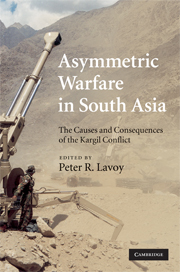Book contents
- Frontmatter
- Contents
- List of maps and tables
- List of contributors
- Preface
- List of abbreviations and acronyms
- 1 Introduction: the importance of the Kargil conflict
- Part 1 Causes and conduct of the conflict
- 2 The strategic context of the Kargil conflict: a Pakistani perspective
- 3 Pakistan's motivations and calculations for the Kargil conflict
- 4 Military operations in the Kargil conflict
- 5 American diplomacy and the 1999 Kargil Summit at Blair House
- 6 Kargil: the nuclear dimension
- 7 Why Kargil did not produce general war: the crisis-management strategies of Pakistan, India, and the United States
- Part 2 Consequences and impact of the conflict
- Part 3 Lessons learned
- Index
7 - Why Kargil did not produce general war: the crisis-management strategies of Pakistan, India, and the United States
from Part 1 - Causes and conduct of the conflict
Published online by Cambridge University Press: 30 March 2010
- Frontmatter
- Contents
- List of maps and tables
- List of contributors
- Preface
- List of abbreviations and acronyms
- 1 Introduction: the importance of the Kargil conflict
- Part 1 Causes and conduct of the conflict
- 2 The strategic context of the Kargil conflict: a Pakistani perspective
- 3 Pakistan's motivations and calculations for the Kargil conflict
- 4 Military operations in the Kargil conflict
- 5 American diplomacy and the 1999 Kargil Summit at Blair House
- 6 Kargil: the nuclear dimension
- 7 Why Kargil did not produce general war: the crisis-management strategies of Pakistan, India, and the United States
- Part 2 Consequences and impact of the conflict
- Part 3 Lessons learned
- Index
Summary
The theory of nuclear revolution holds that states armed with nuclear weapons should not fight conventional wars against each other. The risk of military escalation is supposed to produce such caution among decision-makers that the opposing sides in a crisis will curtail their coercive behavior well short of war. Pakistan partially defied this logic in the spring of 1999 by sending fighters to secretly seize mountainous territory near the strategically important Srinagar–Leh highway in Indian-held Kashmir. Pakistani military planners considered this to be a limited, tactical operation, and calculated that war could be averted through the time-tested combination of military fait accompli, international political pressures, deterrence threats, and Indian restraint. Viewing the territorial intrusion as a blatant act of aggression and a strategic threat, India launched a ferocious military campaign to oust the “invaders,” but stopped short of attacking Pakistani territory or even striking Pakistani military positions across the Line of Control (LoC) separating the Indian- and Pakistani-controlled parts of Kashmir.
During the Cold War, and especially after the 1962 Cuban missile crisis, the United States and the Soviet Union developed elaborate crisis-management strategies to gain advantages over one another during military crises and in their overall strategic competition while at the same time trying to influence domestic and international reactions and attempting to control military escalation. In South Asia's first military crisis since May 1998, when India and Pakistan each conducted nuclear explosive tests and declared themselves nuclear weapons states, New Delhi and Islamabad were forced to practice Cold War-like crisis management during the summer of 1999.
- Type
- Chapter
- Information
- Asymmetric Warfare in South AsiaThe Causes and Consequences of the Kargil Conflict, pp. 171 - 206Publisher: Cambridge University PressPrint publication year: 2009
- 2
- Cited by



